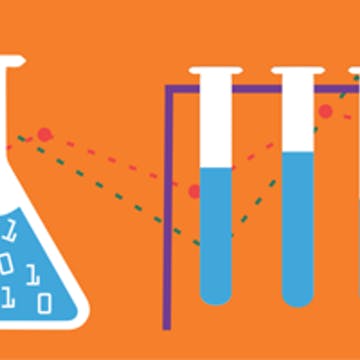
على الرغم من الزيادة الأخيرة في قوة الحوسبة والوصول إلى البيانات على مدى العقدين الماضيين، فإن قدرتنا على استخدام البيانات في عملية صنع القرار إما فُقدت أو لم يتم تعزيزها على الإطلاق في كثير من الأحيان، فليس لدينا فهم قوي للأسئلة التي يتم طرحها وكيفية تطبيق البيانات بشكل صحيح على المشكلة المطروحة.
إن هذه الدورة التدريبية لها غرض واحد، وهو مشاركة المنهجية التي يمكن استخدامها في علم البيانات، للتأكد من أن البيانات المستخدمة في حل المشكلات ذات صلة وتم معالجتها بشكل صحيح لمعالجة السؤال المطروح.
وبناءً عليه، ستتعلم في هذه الدورة التدريبية ما يلي:
- الخطوات الرئيسية المتضمنة في معالجة مشكلة علم البيانات.
- الخطوات الرئيسية المتضمنة...
Read more
Good to know
Save this course
Reviews summary
Highly acclaimed data science methodology course
Activities
Walk through the 'A Gentle Introduction to the Data Science Process' tutorial
Show steps
Prepare for this course by getting an overview of the data science process and its key components.
Browse courses on
Data Science
Show steps
-
Visit the tutorial page and read the introduction.
-
Follow the steps in the tutorial, completing all exercises.
-
Review the summary and reflect on how these concepts relate to the course.
Read `Hands-On Machine Learning with Scikit-Learn, Keras, and TensorFlow`
Show steps
Build a strong foundation for this course by reviewing real-world applications of machine learning and encountering its tools and techniques.
View
Hands-On Machine Learning with Scikit-Learn,...
on Amazon
Show steps
-
Scan the table of contents and read the preface.
-
Read chapters 1 - 3, focusing on understanding the fundamentals of machine learning.
Complete the 'Pandas for Data Analysis' exercises
Show steps
Enhance your data analysis skills and reinforce the concepts covered in the course by completing hands-on exercises using Pandas.
Browse courses on
Python
Show steps
-
Install Pandas and import it into your Python environment.
-
Follow the exercises provided in the 'Pandas for Data Analysis' tutorial.
-
Experiment with different Pandas functions and methods to manipulate and analyze data.
Four other activities
Expand to see all activities and additional details
Show all seven activities
Create a data dictionary for a real-world dataset
Show steps
Develop practical data management skills by creating a data dictionary for a real-world dataset, ensuring data integrity and facilitating data analysis.
Browse courses on
Data Analysis
Show steps
-
Choose a dataset that aligns with your interests or a specific domain.
-
Review the dataset and identify key variables and their attributes.
-
For each variable, define its name, type, format, range, and any relevant metadata.
-
Organize the information in a structured and easy-to-navigate format, such as a spreadsheet or database.
Organize and review course materials regularly
Show steps
Improve retention and understanding by actively organizing and reviewing course materials throughout the learning journey.
Show steps
-
Create a dedicated folder or notebook for course materials.
-
After each class, take time to整理 and summarize key concepts and notes.
-
Periodically review your organized materials to reinforce learning.
Form a study group with classmates
Show steps
Enhance understanding and retention by actively engaging with peers through discussions and collaborative learning.
Show steps
-
Identify a group of classmates with similar learning goals.
-
Establish regular meeting times and a communication channel.
-
Take turns leading discussions, presenting key concepts, and facilitating problem-solving.
Create visual summaries of key data analysis techniques
Show steps
Deepen understanding and improve recall by creating visual representations of key data analysis techniques, reinforcing concepts and facilitating communication.
Browse courses on
Data Analysis
Show steps
-
Identify a specific data analysis technique covered in the course.
-
Create a visual representation, such as a flowchart, infographic, or diagram, that explains the technique's steps and key elements.
-
Share your visual summary with classmates or the instructor for feedback.
Walk through the 'A Gentle Introduction to the Data Science Process' tutorial
Show steps
Prepare for this course by getting an overview of the data science process and its key components.
Browse courses on
Data Science
Show steps
- Visit the tutorial page and read the introduction.
- Follow the steps in the tutorial, completing all exercises.
- Review the summary and reflect on how these concepts relate to the course.
Read `Hands-On Machine Learning with Scikit-Learn, Keras, and TensorFlow`
Show steps
Build a strong foundation for this course by reviewing real-world applications of machine learning and encountering its tools and techniques.
View
Hands-On Machine Learning with Scikit-Learn,...
on Amazon
Show steps
- Scan the table of contents and read the preface.
- Read chapters 1 - 3, focusing on understanding the fundamentals of machine learning.
Complete the 'Pandas for Data Analysis' exercises
Show steps
Enhance your data analysis skills and reinforce the concepts covered in the course by completing hands-on exercises using Pandas.
Browse courses on
Python
Show steps
- Install Pandas and import it into your Python environment.
- Follow the exercises provided in the 'Pandas for Data Analysis' tutorial.
- Experiment with different Pandas functions and methods to manipulate and analyze data.
Create a data dictionary for a real-world dataset
Show steps
Develop practical data management skills by creating a data dictionary for a real-world dataset, ensuring data integrity and facilitating data analysis.
Browse courses on
Data Analysis
Show steps
- Choose a dataset that aligns with your interests or a specific domain.
- Review the dataset and identify key variables and their attributes.
- For each variable, define its name, type, format, range, and any relevant metadata.
- Organize the information in a structured and easy-to-navigate format, such as a spreadsheet or database.
Organize and review course materials regularly
Show steps
Improve retention and understanding by actively organizing and reviewing course materials throughout the learning journey.
Show steps
- Create a dedicated folder or notebook for course materials.
- After each class, take time to整理 and summarize key concepts and notes.
- Periodically review your organized materials to reinforce learning.
Form a study group with classmates
Show steps
Enhance understanding and retention by actively engaging with peers through discussions and collaborative learning.
Show steps
- Identify a group of classmates with similar learning goals.
- Establish regular meeting times and a communication channel.
- Take turns leading discussions, presenting key concepts, and facilitating problem-solving.
Create visual summaries of key data analysis techniques
Show steps
Deepen understanding and improve recall by creating visual representations of key data analysis techniques, reinforcing concepts and facilitating communication.
Browse courses on
Data Analysis
Show steps
- Identify a specific data analysis technique covered in the course.
- Create a visual representation, such as a flowchart, infographic, or diagram, that explains the technique's steps and key elements.
- Share your visual summary with classmates or the instructor for feedback.
Career center
Data Scientist
Data Analyst
Business Analyst
Statistician
Machine Learning Engineer
Data Engineer
Database Administrator
Software Engineer
Quantitative Analyst
Actuary
Economist
Financial Analyst
Market Researcher
Operations Research Analyst
Risk Analyst
Reading list
Share
Similar courses
OpenCourser helps millions of learners each year. People visit us to learn workspace skills, ace their exams, and nurture their curiosity.
Our extensive catalog contains over 50,000 courses and twice as many books. Browse by search, by topic, or even by career interests. We'll match you to the right resources quickly.
Find this site helpful? Tell a friend about us.
We're supported by our community of learners. When you purchase or subscribe to courses and programs or purchase books, we may earn a commission from our partners.
Your purchases help us maintain our catalog and keep our servers humming without ads.
Thank you for supporting OpenCourser.



